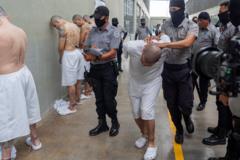Despite court orders against the use of the Alien Enemies Act for deportation, the U.S. government has sent 17 alleged gang members to El Salvador, with Salvadoran officials stating that the deportees include members of notorious gangs.
U.S. Government Continues Deportation of Alleged Gang Members to El Salvador

U.S. Government Continues Deportation of Alleged Gang Members to El Salvador
The U.S. has deported 17 more alleged gang affiliates to El Salvador, amidst ongoing legal challenges regarding the constitutionality of such actions.
Article:
The U.S. government has taken the controversial step of deporting 17 alleged gang members to El Salvador, further straining diplomatic ties amidst ongoing legal challenges. This decision was announced by Secretary of State Marco Rubio, who noted that the deportees are associated with the notorious Tren de Aragua and MS-13 gangs.
Following the deportation, El Salvador's officials revealed that the group comprises both Venezuelans and Salvadorans. This move comes alongside a backdrop of legal battles, as a recent court ruling aimed to halt deportations conducted under the Alien Enemies Act, a law infrequently invoked since its inception in 1798, primarily during wartime.
Rubio's statement described the deportees as "murderers and rapists," though he refrained from specifying names or details of their alleged offenses. In a visually impactful post on X, El Salvador’s President Nayib Bukele provided an edited video that showcased the arrival of these individuals at a mega-prison, emphasizing their criminal backgrounds. "This operation is another step in the fight against terrorism and organized crime," Bukele asserted.
In exchange for accepting deportees, the Salvadoran government has negotiated $6 million in aid from the U.S. However, families of some deported individuals have contested claims regarding gang affiliations, contesting that their relatives lack ties to such organizations.
Although the Trump administration has previously utilized the Alien Enemies Act to expel more than 100 Venezuelans, civil rights organizations, including the ACLU, have contested these actions in court, claiming violations of due process. A federal judge has temporarily halted the use of the law, yet deportations continue, raising significant legal and ethical questions.
The next hearing concerning the explosive legal situation is set for Thursday, as the U.S. finds itself grappling with the implications of its immigration policies.
The U.S. government has taken the controversial step of deporting 17 alleged gang members to El Salvador, further straining diplomatic ties amidst ongoing legal challenges. This decision was announced by Secretary of State Marco Rubio, who noted that the deportees are associated with the notorious Tren de Aragua and MS-13 gangs.
Following the deportation, El Salvador's officials revealed that the group comprises both Venezuelans and Salvadorans. This move comes alongside a backdrop of legal battles, as a recent court ruling aimed to halt deportations conducted under the Alien Enemies Act, a law infrequently invoked since its inception in 1798, primarily during wartime.
Rubio's statement described the deportees as "murderers and rapists," though he refrained from specifying names or details of their alleged offenses. In a visually impactful post on X, El Salvador’s President Nayib Bukele provided an edited video that showcased the arrival of these individuals at a mega-prison, emphasizing their criminal backgrounds. "This operation is another step in the fight against terrorism and organized crime," Bukele asserted.
In exchange for accepting deportees, the Salvadoran government has negotiated $6 million in aid from the U.S. However, families of some deported individuals have contested claims regarding gang affiliations, contesting that their relatives lack ties to such organizations.
Although the Trump administration has previously utilized the Alien Enemies Act to expel more than 100 Venezuelans, civil rights organizations, including the ACLU, have contested these actions in court, claiming violations of due process. A federal judge has temporarily halted the use of the law, yet deportations continue, raising significant legal and ethical questions.
The next hearing concerning the explosive legal situation is set for Thursday, as the U.S. finds itself grappling with the implications of its immigration policies.





















